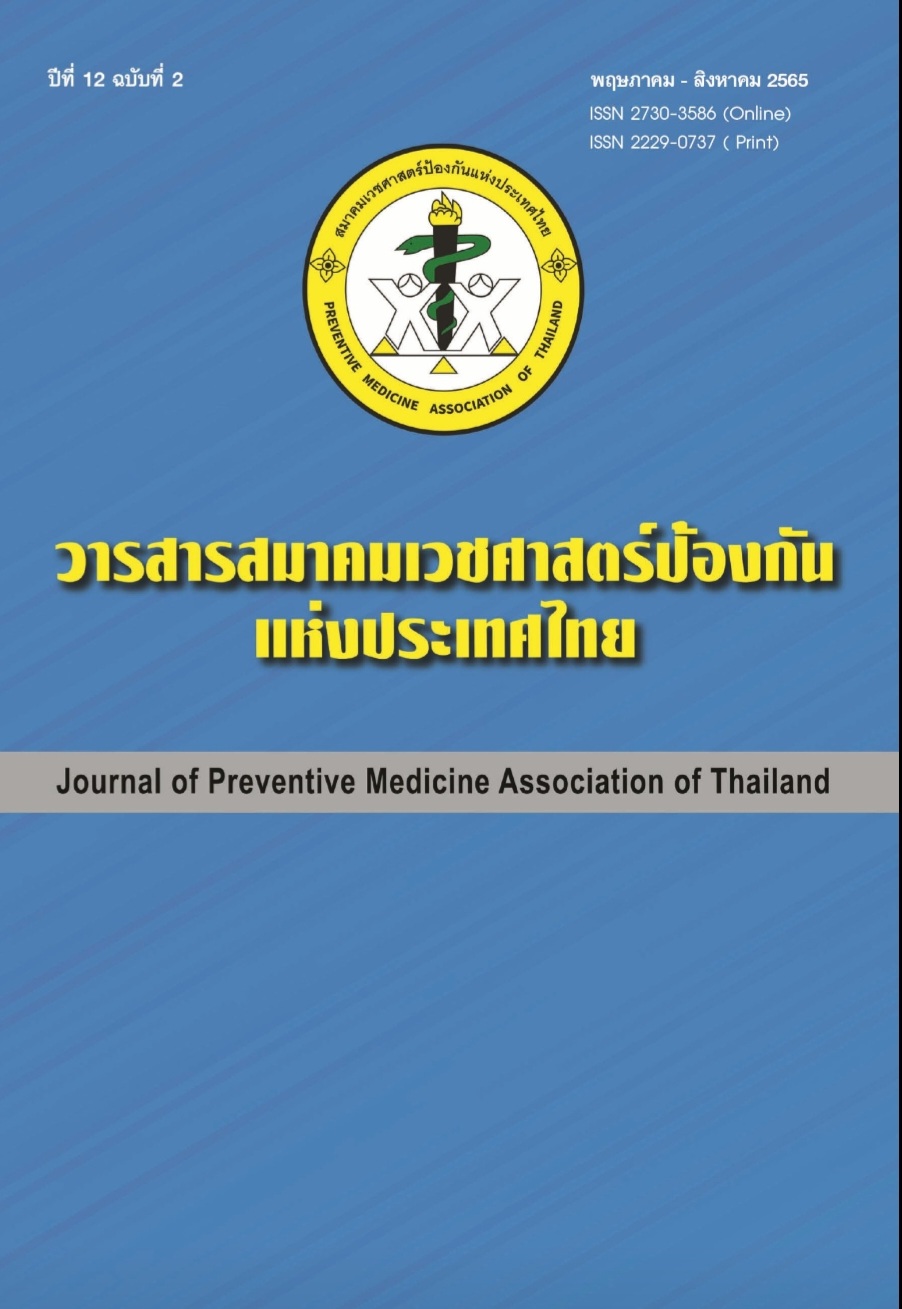Healthcare Professionals' Attitude Toward Travel Medicine Online Video clips Developed by the Institute of Preventive Medicine
Keywords:
English, online learning, Travel Medicine, Healthcare professional, communication skillAbstract
International tourism increases the risks of communicable diseases and health problems for tourists. Therefore, the Ministry of Public Health, Thailand, established the Institute of Preventive Medicine to provide training on Travel Medicine. However, many Healthcare professionals were unable to communicate effectively in English. To solve this problem, the Institute of Preventive Medicine developed the Travel Medicine online video lessons (TM-Video clips) broadcasted on social media to provide opportunities for professionals to practice their English skills, focusing on speaking. After launching the lessons for media evaluation, the Institute initiated a project to gather feedback from healthcare professional learners who had already practiced English through the online TM-Video clips. This study investigates the healthcare professional's attitudes toward learning English oral communication and English related to Travel Medicine via TM-Video clips broadcasted on YouTube in three aspects: affective, behavioral, and cognitive. A set of questionnaires was given to 40 healthcare professionals who had already studied the online TM-Video clip lessons during September – December 2021.
The results showed that the healthcare professionals participating in this survey demonstrated their positive attitudes toward learning English from the online TM-Video clips. Their English proficiency and skills in travel medicine improved in all aspects, particularly their speaking ability. They also reported that they could improve listening, grammar, vocabulary, speaking and reading, writing skills, and English pronunciation, including Travel Medicine content. Furthermore, they indicated that they could apply the knowledge to perform their services at their workplaces better and in their daily lives.
In conclusion, the healthcare professionals expressed positive attitudes towards learning English oral communication and English related to Travel Medicine through online video clips. The TM-Video clips, which contained the travel medicine contents and contexts in English, provided the knowledge to fulfill the professionals' needs for completing their tasks. In addition, the online TM-Video lessons offered them more opportunities to practice English wherever and whenever they were ready to learn, as they could conveniently access the lessons through the Internet. However, some healthcare professionals admitted that the real classroom was better because there was no human interaction while learning the online TM-Video lessons.
References
Ministry of Tourism and sport. Tourism receipts from International tourist arrivals by expenditure item Q1-Q4 2018 [Internet] 2018. [cited 2019 Sep 10]. Available from:https://www.mots.go.th/allcont.phpcid=529&filename=
Tourism Authority of Thailand. Tourism statistics 2020 [Internet]. 2021 [cited 2021 Feb 20]. Available from:https://mots.go.th/more_news_new.Php?cid=592
Crystal D. English as a global language. Cambridge: Cambridge University Press; 1997.
Hayes SC, Farnill D. Medical training and English language proficiency. Med Educ 1993;27(1):6-14.
Fishbein M, Ajzen I. Belief, attitude, intention, and behavior: an introduction to theory and research. Reading. MA: Addison- Wesley; 1975.
Eagly AH, Chaiken S. The psychology of attitudes, Fort Worth. TX: Harcourt Brace Jovanovich; 1993.
Kiesler CA, Collins BE, Miller N. Attitude change: a critical analysis of theoretical approaches. New York: John Wiley & Sons; 1969.
Akimanimpaye F, Fakude LP. Attitudes of undergraduate nursing students towards e-learning at the University of the Western Cape, South Africa: teaching and learning in health care professions. African Journal for Physical Health Education, Recreation and Dance 2015;21(1):418-33.
Başöz T, Çubukçu F. 2014. Pre-service EFL teacher's attitudes towards Computer Assisted Language Learning (CALL). Procedia-Social and Behavioral Sciences 2014;116:531-35.
Sivaci S. Adult EFL learners' perceptions on the relations between computer assisted language learning and learner autonomy. International Journal of Language Academy 2016;4(3):206-24.
Tafazoli D, Gómez ME, Huertas CA. A cross-cultural study on the attitudes of English language students towards computer-assisted language learning. Teaching English with Technology 2018;18(2):34-68.
Kenny A. Online learning: enhancing nurse education. Journal of Advanced Nursing 2002;38(2):127-35.
Karaman S. Nurses' perceptions of continuing online education. BMC Med Educ 2011;86: doi.org/10.1186/1472-6920-11-86
Yu S, Yang KF. Attitudes toward web-based distance learning among public health nurses in Taiwan: a questionnaire survey. Int J Nurs Stud 2006;43(6):767-74.
Xing W, Ao L, Xiao H, Cheng L, Liang Y, Wang J. Nurses' attitudes towards, and needs for online learning: differences between rural and urban hospitals in Shanghai, East China. Int J Environ Res Public Health 2018;15(7):1495. doi: 10.3390/ijerph15071495.
Downloads
Published
How to Cite
Issue
Section
License
Copyright (c) 2022 Journal of Preventive Medicine Association of Thailand

This work is licensed under a Creative Commons Attribution-NonCommercial-NoDerivatives 4.0 International License.
บทความที่ลงพิมพ์ในวารสารเวชศาสตร์ป้องกันแห่งประเทศไทย ถือเป็นผลงานวิชาการ งานวิจัย วิเคราะห์ วิจารณ์ เป็นความเห็นส่วนตัวของผู้นิพนธ์ กองบรรณาธิการไม่จำเป็นต้องเห็นด้วยเสมอไปและผู้นิพนธ์จะต้องรับผิดชอบต่อบทความของตนเอง






